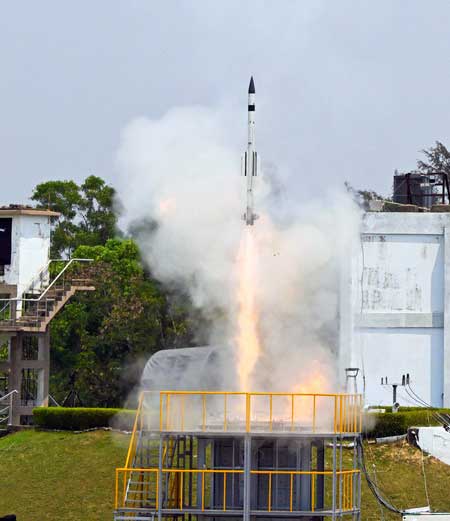The Indian space agency has successfully disposed of the communication satellite GSAT-12 in a post mission disposal (PMD) operation last month.
According to the Indian Space Research Organisation (ISRO), the post mission disposal operation of GSAT-12 was completed on March 23, 2023.
GSAT-12 is the twenty-third Geosynchronous Earth Orbital (GEO) satellite to undergo PMD before decommissioning, ISRO said.
The satellite carrying 12 extended C band transponders was launched on July 15, 2011. It was located at 83 degrees E longitude till March 2021. After the launch of its replacement satellite CMS-01 in 2020, it was later relocated to 47.96 degrees E longitude. The satellite served for more than a decade.
The GEO regime is one of the most populated and highly utilised regions. Internationally accepted space debris mitigation guidelines by the UN and IADC recommend disposing of an object away from the GEO region at its end-of-life.
The recommended practice is to re-orbit the object to a nearly circular "graveyard" orbit sufficiently above the GEO region so that the orbit would not decay back into the GEO-protected zone under the influence of perturbation forces, such as non-uniformity of Earth shape, Sun's Moon's gravity, solar radiation pressure, etc., within another 100 years, ISRO said.
Hence, the final disposal orbit must meet specific criteria on the minimum raise in perigee altitude depending on the object's reflectivity, mass, shape, and size. The graveyard orbit also needs to be nearly circular (very low orbital eccentricity, less than or equal to 0.003).
According to ISRO, for GSAT-12, the required minimum raise in perigee altitude was estimated to be 261 km. As a result of meticulous operations management by the Master Control Facility (MCF), the available fuel of GSAT-12 was more than sufficient to meet this goal.
A series of seven manoeuvres were carried out to raise the orbit above the GEO altitude of 35,786 km. The first manoeuvre on March 16, 2023, was a shorter burn to circularize the orbit, followed by another six burns, typically of 150 seconds duration.
After completing the seventh burn on March 19, the satellite reached a super-synchronous circular orbit of nearly 400 km above the GEO altitude.
Space Debris Mitigation guidelines also recommend passivation/removing all energy sources, fluidic and electrical, to minimise the risk of any post-mission accidental break-up.
Four inclination changing manoeuvres of GSAT-12 were carried out during March 20-22 to spend the remaining propellant. On March 23, the final passivation manoeuvre was carried out to vent out the remaining fuel by firing the oppositely mounted thrusters, cancelling the net thrust without affecting the orbit, the Indian space agency said.
As part of electrical passivation, all rotating mechanisms such as the momentum wheels, reaction wheels and gyros were turned off, batteries were disconnected from the solar panels and discharged. Finally, the transmitters were switched off to avoid any potential RF interference. The passivation activities were completed on March 23, 2023.
All operations were conducted by MCF, Hassan, in coordination with U R Rao Satellite Centre, SATCOM Programme Office, and IS4OM (ISRO System for Safe and Sustainable Space Operations Management).

.jpg)




NPCI to decide on person-to-merchant payments cap on UPI transactions: RBI
In order to further boost digital payments, the National Payments Corporation of India will be enabled to set the limit on person-to-merchants transactions via Unified Payments Interface (UPI), RBI Governor Sanjay Malhotra said on Wednesday.
New AI algorithm to predict risk of cardiovascular events, heart-related death
A team of researchers in South Korea has developed a novel artificial intelligence (AI)-based algorithm that uses electrocardiograph (ECG)2 data to predict the risk of cardiovascular events, and heart-related death.
India successfully flight-tests indigenously-developed vertically-launched Surface-to-Air Missile
In a boost to India's precision firepower, the Defence Research & Development Organisation (DRDO) and the Indian Navy conducted the successful flight-test of indigenously-developed Vertically-Launched Short-Range Surface-to-Air Missile (VLSRSAM) on Wednesday, an official statement said.
Unplanned welcome: Dolphins greet astronauts as they return home after extended space mission
Astronauts Sunita Williams and Butch Wilmore, along with NASA’s Nick Hague and Russian cosmonaut Aleksandr Gorbunov, have returned to Earth after a lengthy journey that turned a planned eight-day mission into a nine-month in space.
Stranded US astronauts return to Earth, after nine months in space
The SpaceX Dragon spacecraft carrying them and two other astronauts—Nick Hague and Russian cosmonaut Aleksandr Gorbunov—splashed down into the waters off the coast of Florida state just minutes before 6 p.m., as NASA had announced.
Google to acquire cloud security platform Wiz for $32 billion
Tech major Google on Tuesday announced to acquire Wiz, a leading cloud security platform headquartered in New York, for $32 billion in an all-cash transaction.
Ahead of Sunita William’s ‘homecoming’, PM Modi pens letter to India’s illustrious daughter
As the NASA astronauts Sunita Williams and Butch Wilmore begin their journey back home from space, after staying ‘stranded’ at the International Space Station (ISS) for about nine months, Prime Minister Narendra Modi has written a letter to one of India’s most illustrious daughters hoping for her safe return.
Sunita Williams set to return to Earth tomorrow
With the pair of US astronauts stranded for more than nine months on the International Space Station (ISS), the National Aeronautics and Space Administration (NASA) has confirmed that the duo will return to Earth on Tuesday evening.